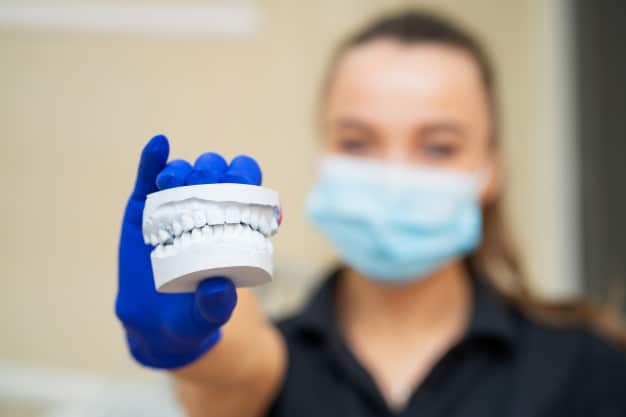Complete and partial dentures are a well-known treatment for tooth loss since they can replace several missing teeth or the entire arch in a procedure that is very simple and that takes a lot less time than other tooth replacement options.
Even when currently it is known that dentures are not the best treatment to replace natural teeth and we have better permanent solutions for tooth loss like dental implants, it can’t be denied that dentures have benefits:
- They are affordable.
- They provide a proper bite and allow the patient to smile, eat and speak again.
- Patients don’t need to go under surgery.
- They help to keep the facial structure.
- If they are done with quality materials by an expert, they can look just like natural teeth.
However, wearing dentures can have some side effects like discomfort, speech difficulties, difficulty eating, and even affecting the taste when eating. Over time, dentures lead to more complications such as bone loss. This is why dentures are only recommended when they are the only convenient option for the patient.
These are some of the side effects that denture wearers may experience and how to fix them in order to have a more comfortable experience and avoid pain.
What are the most common side effects of wearing dentures?
Full and partial dentures need an adjustment period after placement. During this period the patient may experience mouth sores and some of these side effects, the dentist will make the correct adjustments so the denture can fit properly.
It is also normal to feel some discomfort while you are getting used to wearing the denture, but keep in mind that a properly fitted denture shouldn’t cause any pain. If you still feel mouth sores and pain at any point after the adjustment period, it is important to visit the dentist to prevent bigger problems.
Problems to speak
Speech difficulties are a usual issue for patients who wear dentures, especially during the first weeks when the patient is still not used to the denture. Denture wearers may have gargling speech, whistling sounds, and lisping, which can be very frustrating.
This happens because the mouth finds the new denture very different from your natural teeth so it produces more saliva and the tongue is trying to find its new comfortable position when speaking.
The only way to correct these speech problems is through practice and patience. A good way to improve speaking is to practice reading out loud or even doing tongue twisters. Over time your mouth and tongue will get used to the denture and you will be able to speak again with no trouble.
Losing the sense of taste
A lost sense of taste is common among patients who wear dentures, especially during the first weeks but it can also appear after some time. There are some reasons behind this.
Adapting to the new denture
The first reason is that the taste buds, as well as the tongue and the rest of the mouth, are adapting to the new dentures, which could affect them for a short period of time. Usually, patients recover the taste after the first week.
Using too much denture adhesive
The excessive use of denture adhesive could be another reason for the taste buds to not work properly. Make sure to use the correct amount of adhesive in the dentures to avoid this problem.
Bad oral hygiene
Finally, the problem may be caused by bad oral hygiene. When food debris and bacteria accumulate in the teeth and inner parts of the dentures, the taste buds can be affected which could lead to loss of the sense of taste.
Proper denture care is essential to avoid these issues and ensure a healthy experience. Clean your dentures at least once a day with a toothbrush and keep them during the night on a soaking solution. Don’t forget to take care of your mouth by cleaning your gums and rinsing with mouthwash after every meal.
Experience difficulty eating
Having trouble eating is possibly the most usual issue for patients with full dentures since the person must almost learn how to chew with their new set of teeth. During the first weeks with the dentures, eating could be painful and it could be a little complicated to swallow, but it is all part of the process. With enough practice, you will learn how to properly eat again.
While you are getting used to the denture, eat only soft foods and liquids, chew slowly, and avoid sticky foods, with time you will gain confidence in your new teeth so you can start chewing normal food again.
If what is causing you chewing issues is that the dentures move a little, you could try using some adhesive. In case the problem doesn’t get better with the adhesive, you must visit your dentist to get the correct adjustments.
Choosing denture implants
The best alternative to avoid this problem is to choose denture implants instead of regular dentures. Denture implants are used to fix the dentures to the gums so they won’t move when eating or speaking, that is why they are a lot more comfortable than regular dentures.
The implants need to be placed with oral surgery and they can be used to hold fixed or removable dentures.
Bone loss, the biggest side effect of dentures
The biggest disadvantage of dentures is that denture overuse can cause bone loss since the bone is not being stimulated and it starts to be reabsorbed. If possible, your dentist may recommend other tooth replacement options that are permanent and don’t compromise the bone, such as the implant treatment All-On-4.
Tips to take care of your dentures
Regular dentist appointments are essential for patients with dentures
Because of bone loss, dentures need to be constantly fitted so they don’t cause pain or discomfort. A denture that doesn’t fit properly can cause small cuts in the gums, which can lead to an infection. Your denture will adjust the fitting using fillings.
Good oral health is needed to ensure a good experience with dentures and prevent infections.
Avoid sticky foods and chew slowly to prevent broken dentures. In some cases, broken dentures can be repaired so you don’t have to spend more money on a new denture.




